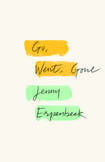The secret life of refugees in Berlin
Richard is a newly retired classics professor living outside contemporary Berlin. Recently widowed, he has a life of melancholy memories, pleasant boredom and simple rituals. Comfortably muffled, he is struck one night by news reports of African refugees staging a protest in a city square he had visited that same day: “Why didn’t he see the men?”
This timely new novel by Jenny Erpenbeck, a German writer and opera director, unfolds as Richard’s effort to do more than just see these men. He begins visiting with them and learns of the various tragic circumstances that pushed each out of his home country in Africa. He offers the men car rides to appointments with immigration officials and dentists, language lessons, introductions to German Christmas traditions and occasional odd jobs with his well-off friends. He even gives one man a few thousand euros to purchase a tract of land in Ghana for his family members to farm.
In recompense, Richard is invigorated, if also frustrated by the endless bureaucratic entanglements that confront present-day refugees in even the most welcoming of European countries. He simultaneously struggles with ambivalence toward, even resistance to, the friendship, gratitude and hopefulness that he experiences from the African men with whom he spends more of his time and money. Finally, he is robbed, and he hates it that the evidence very strongly points to the bright young man who visits his house to play the piano.
Go, Went, Gone never becomes preachy or sentimental. Instead, it is quietly bracing.
In all of this eventfulness, Go, Went, Gone never becomes preachy or sentimental. Instead, it is quietly bracing, as when Richard recognizes “he’s one of very few people in this world who are in a position to take their pick of realities.” By the end of the novel, Richard decides to bring opposing realities together. He knows he cannot change the world, and that there is still much to be done and much that he can do.
This article also appeared in print, under the headline “The invisibles,” in the February 5, 2018, issue.









